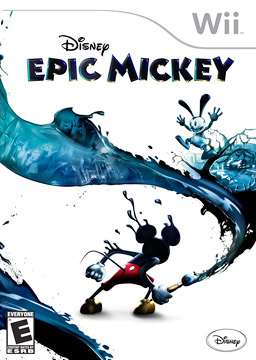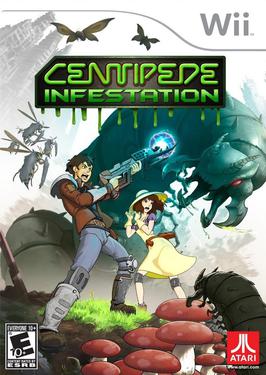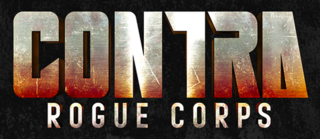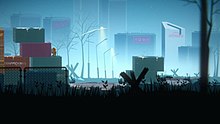
Wasteland is a role-playing video game developed by Interplay Productions and published by Electronic Arts in 1988. The first installment of the Wasteland series, it is set in a futuristic, post-apocalyptic America destroyed by a nuclear holocaust generations before. Developers originally made the game for the Apple II and it was ported to the Commodore 64 and MS-DOS. It was re-released for Microsoft Windows, OS X, and Linux in 2013 via Steam and GOG.com, and in 2014 via Desura. A remastered version titled Wasteland Remastered was released on February 25, 2020, in honor of the original game's 30th anniversary.

Battle Clash is a 1992 light gun shooter video game developed by Intelligent Systems and published by Nintendo for the Super Nintendo Entertainment System. It is one of several titles that requires the Super Scope light gun. The plot takes place in a futuristic post-apocalyptic Earth, where battles are fought with mechs called Standing Tanks (STs) and the winner takes control of the world. A young man named Mike Anderson participates in the Battle Game to face the ruthless champion Anubis and avenge his father's death. The player acts as the gunner of the ST Falcon piloted by Anderson, taking on Anubis and his subordinate chiefs in one-on-one fights.

Wii Sports is a 2006 sports simulation video game developed and published by Nintendo for the Wii video game console. The game was released in North America along with the Wii on November 19, 2006, and in Japan, Australia, and Europe the following month. It was included as a pack-in game with the console in all territories except Japan, making it the first sports game included with the launch of a Nintendo system since Mario's Tennis for the Virtual Boy in 1995. The game was later released on its own as part of the Nintendo Selects collection of games.

BlaZeon is a horizontally scrolling shoot 'em up arcade game released by Atlus in 1992 and was ported to the Super Nintendo Entertainment System in the same year. The game's most distinguishable feature is that players come equipped with a device that allows them to freeze and control certain robots.

Rage is a first-person shooter video game developed by id Software and published by Bethesda Softworks, released in October 2011 for Microsoft Windows, the PlayStation 3, and the Xbox 360, and in February 2012 for OS X. It was first shown as a tech demo at the 2007 Apple Worldwide Developers Conference and was announced at the QuakeCon. Rage uses id Software's id Tech 5 game engine and is the final game released by the company under the supervision of founder John Carmack.

Nostalgia is a role-playing video game developed by Red Entertainment and Matrix Software for the Nintendo DS handheld system. Initially released in November 2008 for Japanese audiences by Tecmo, an English version of the game was released for North America by Ignition Entertainment in October 2009. The game's development was headed by producer Keisuke Kikuchi, with programming and three-dimensional graphics by Matrix Software, who had previously developed Square Enix's Nintendo DS versions of Final Fantasy III and IV.

Epic Mickey is a 2010 platform game developed by Junction Point Studios and published by Disney Interactive Studios for the Wii. It was released in November 2010 in North America and PAL territories and August 2011 in Japan by Nintendo. The game focuses on Mickey Mouse, who accidentally damages a world created by Yen Sid for forgotten characters and concepts and must save it from the Blot. The game features Oswald the Lucky Rabbit, a character created by Walt Disney and Ub Iwerks and originally owned by Universal Pictures; The Walt Disney Company gained ownership of the character in 2006. The game marks the first time that Mickey and Oswald have appeared together.

Centipede: Infestation is a video game developed by WayForward Technologies and published by Atari Interactive for the Wii and the Nintendo 3DS. It is a re-imagining of the Centipede video game franchise. The game was also going to be released in Europe and was even rated by PEGI but it was canceled.

Wasteland 2 is a post-apocalyptic role-playing video game developed by inXile Entertainment and published by Deep Silver. It is the sequel to 1988's Wasteland, and was successfully crowdfunded through Kickstarter. After the postponement of the original release date from October 2013, it was released for Microsoft Windows, OS X, and Linux in September 2014. An enhanced version of the game, named Wasteland 2: Director's Cut, was released in October 2015, including versions for PlayStation 4, Xbox One, and Nintendo Switch.

Wii Sports Club is a sports simulation video game, developed by Nintendo and Bandai Namco Studios and published by Nintendo for the Wii U throughout 2013 and 2014. It is the third entry in the Wii Sports series, a part of the larger Wii series. As an enhanced remake of the 2006 Wii launch title Wii Sports, it includes five minigames that replicate Tennis, Baseball, Bowling, Golf, and Boxing, and are controlled with motion controls that replicate the sports. New to the game is additional control schemes using the Wii U GamePad, online multiplayer, and Wii Motion Plus support. Players are organized into clubs that represent different regions, and scores and stats are tracked on Nintendo's social network Miiverse. Players could also communicate with each other during and after online matches using Miiverse. Each sport can be purchased individually or rented for a certain amount of time via a pass.

Celeste is a 2018 platform game developed and published by indie studio Maddy Makes Games. The player controls Madeline, a young woman with anxiety and depression who aims to climb Celeste Mountain. During her climb, she encounters several characters, including Part of You a personification of her self-doubt who attempts to stop her from climbing the mountain.

Wasteland 3 is a role-playing video game developed by inXile Entertainment and published by Deep Silver. It is a sequel to Wasteland 2 (2014) and was released for Microsoft Windows, PlayStation 4 and Xbox One on August 28, 2020. A Linux and macOS port was released on December 17, 2020.

Shin Megami Tensei V is a 2021 role-playing video game developed by Atlus for Nintendo Switch. It is part of the Shin Megami Tensei series, the central series in the Megami Tensei franchise. It was published by Atlus in Japan, Sega in North America, and Nintendo in Europe. The game follows a high school student drawn into Da'at, a post-apocalyptic realm inhabited by warring factions of angels and demons after Lucifer kills the Creator and triggers a contest to remake the world. The story has multiple endings dictated by the player's choices and alliances. The gameplay features free-roaming exploration of Da'at, a turn-based battle system based on exploiting weaknesses, and a system allowing the player to recruit and fuse demons fight alongside them.

Doom Eternal is a 2020 first-person shooter game developed by id Software and published by Bethesda Softworks. The sequel to Doom (2016), and the seventh game in the Doom series, it was released for PlayStation 4, Stadia, Windows, and Xbox One on March 20, 2020, with a port for Nintendo Switch released on December 8, 2020, and versions for PlayStation 5 and Xbox Series X/S released on June 29, 2021.
Wasteland is a role-playing video game series created by Brian Fargo. The first game, Wasteland, was originally developed by Interplay Productions and published by Electronic Arts in 1988. inXile Entertainment later acquired the intellectual property from Electronic Arts and developed two sequels, Wasteland 2 (2014) and Wasteland 3 (2020), based on crowdfunding and published by Deep Silver. The games are set in post-apocalyptic open worlds and features turn-based combat similar to that of the earlier Fallout games, of which they are a spiritual predecessor. Xbox Game Studios owns the series after their acquisition of inXile Entertainment.

Untitled Goose Game is a 2019 indie puzzle stealth game developed by House House and published by Panic Inc. Players control a goose who bothers the inhabitants of an English village. Players must use the goose's abilities to manipulate objects and non-player characters to complete objectives. It was released for macOS, Nintendo Switch, Windows, PlayStation 4, and Xbox One.

Contra: Rogue Corps is a run and gun twin-stick shooter in the Contra series developed by Toylogic and published by Konami. It was released on September 24, 2019 for the Nintendo Switch, PlayStation 4, Windows, and Xbox One.

Rad is a roguelike action game developed by Double Fine and published by Bandai Namco Entertainment. It was released for Microsoft Windows, Nintendo Switch, PlayStation 4, and Xbox One in August 2019 and for Amazon Luna in May 2021.

Encased: A Sci-Fi Post-Apocalyptic RPG, is an isometric turn-based RPG developed by Dark Crystal Games and inspired by games like Fallout and Wasteland as well as Soviet-era sci-fi novel Roadside Picnic. The game was released in early access on Microsoft Windows on September 26, 2019, and its full release was on September 7, 2021.

Venba is a narrative cooking video game developed and published by Visai Games. The story begins in 1988 and follows an immigrant Indian couple settling down in Canada and adjusting their day-to-day lives in the new environment. The player controls the titular character, Venba, an Indian woman who moves with her husband to Toronto, where they eventually have a son. The game draws heavily from Tamil culture and South Indian cuisine. The game was released on July 31, 2023, for Nintendo Switch, PlayStation 5, Windows, Xbox One, and Xbox Series X/S.




















